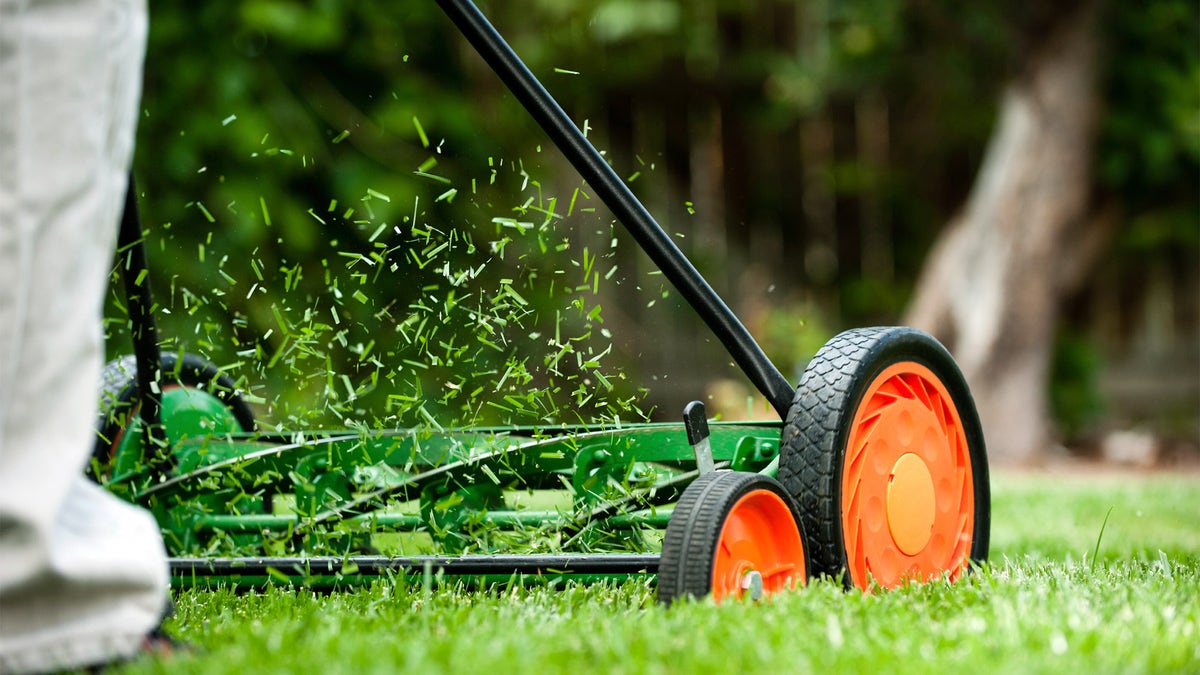
lawn mowing
The long-awaited arrival of spring means different things to different people: a physical and spiritual renewal, an eager farewell to that now-grungy Marmot and Canadian Goose outerwear for (hopefully) another year, a reminder that a new season of "Game of Thrones" is finally right around the corner. And for some of us, it means yard work.
I love spring, when my yard's 50 shades of gray explode into a lush green landscape. Just one problem: I dread all the work that goes into nurturing every sprout and yanking every weed, chores that can eat up every weekend into Memorial Day. But over the years, I've developed a few shortcuts to this oft-arduous process. And I'm willing to share them.
So, throw out that OCD homeowner's maintenance manual, and instead kick off the season with this installment of our Lazy Homeowner's Guide -- tricks and hacks that make springtime prep work for your yard and garden easier, faster, and cheaper.
Make a low-maintenance garden
Growing your own vegetables is time-consuming and expensive, especially if you factor in the price of your labor. I once did the calculations and figured out that a single tomato I grew had cost me $19.95! That's some tomato.
Still, there's plenty of satisfaction (and peace of mind) in knowing just where your veggies come from. So here's how to make the process easier:
- Plant veggies directly in a plastic bag of garden center soil, which is rich and weed-free. Mulch on top to hide the unsightly plastic. As long as the bag is at least quart-size, that's plenty of growing room for most veggies, plus the plastic barrier will help retain moisture and cut down on watering. At the end of the season, dump the soil, which will help enrich your garden.
- Save time and money watering your plants by installing drip hoses throughout your gardens. Drip hoses use far less water than sprinklers, which can be hard to regulate and require frequent moving.
- Make life simple by planting ground cover, such as pachysandra, which is low maintenance, easy to grow and doesn't require much water, says Missy Henriksen, vice president of public affairs for the National Association of Landscape Professionals.
Feed the soil
It's a simple equation: Rich soil means healthy plants. So if you forgot to lime your garden last fall, you can quickly amend garden soil by raking in these quick-fix household items:
- Coffee grounds: Grounds from your daily cup of joe will improve soil drainage, aeration, and water retention. Many coffee shops are happy to give you spent grounds, which you can dig into the garden beds or add to the compost pile. When your garden starts to grow, steep 2 cups of grounds in 5 cups of water and sprinkle on young plants. Make a fresh cup of java for yourself. You've earned it.
- Fireplace ashes: Hardwood ashes are a good source of potash for gardens with acidic or low-potassium soil. Just make sure to spread 2 gallons per 100 square feet.
- Eggshells: Place crumbled shells into planting holes. The calcium helps prevent tomato blossom-end rot, and the shards repel slugs and other garden pests.
And while composting is great for a garden, making compost is a tedious time-drain that typically takes 6 to 12 months. To speed up the process, pulverize your "brown" organic matter -- branches, leaves, cardboard -- in a wood chipper or shredder before adding to the pile. You'll have rich compost in half the time.
Cut corners on lawn mowing
In the spring, it's well worth your while to sharpen your mower blades right at the beginning of the growing season: This gives young blades of grass clean cuts that resist turf diseases, saving you time and energy in the long run reviving rough patches, says Chris Lemcke, national technical director for Weed Man USA. Also, when you mow, let clippings land on lawns; they'll decompose and enrich the soil. If you must bag clippings, add them to your compost pile or use them to mulch flower and vegetable beds.
Eliminate weeds before they grow
The best weeds are ones that never sprout. Sabine Schoenberg, creator of This New House, tells homeowners to use a pre-emergent herbicide, which kills pernicious plants before they sprout. For areas where you plan to seed something -- like your lawn, of course -- seed first, then apply herbicide six weeks later (read the package label for timing, because pre-emergents vary). In those places you don't plan to seed -- like garden paths and vegetable gardens -- spread herbicide then plant seedlings, which are strong enough to grow regardless.
If you miss the moment, kill young weeds by spraying them with horticultural vinegar (20% acetic acid) or carefully dousing them with boiling water. Make sure your aim is true, because both liquids can kill good plants, too. Once your wanted plants have sprouted, cover gardens with 2 to 4 inches of mulch to keep down weeds, retain moisture, and reduce water runoff. You can also lay down newspaper or old curtains in garden paths to block sunlight and prevent weeds from growing. I've used rolls of wallpaper I picked up cheap at yard sales.
Use these shortcuts to clean up
After many months in storage, summertime equipment can stand a thorough cleaning. Here's how to lighten the workload:
- To shine rusty tools, soak them in white vinegar for 24 hours, then scrub with steel wool. To keep them from rusting again, store tools in a bucket of builder's sand. Really.
- Clean stains on plastic patio furniture by rubbing marks with a dab of white toothpaste. To revive faded colors, polish with a small amount of petroleum jelly.
- Clean gunky grills by heating up grates then scrubbing them with a crumpled ball of aluminum foil. Or, remove the top rack and place the grills directly in your dishwasher.